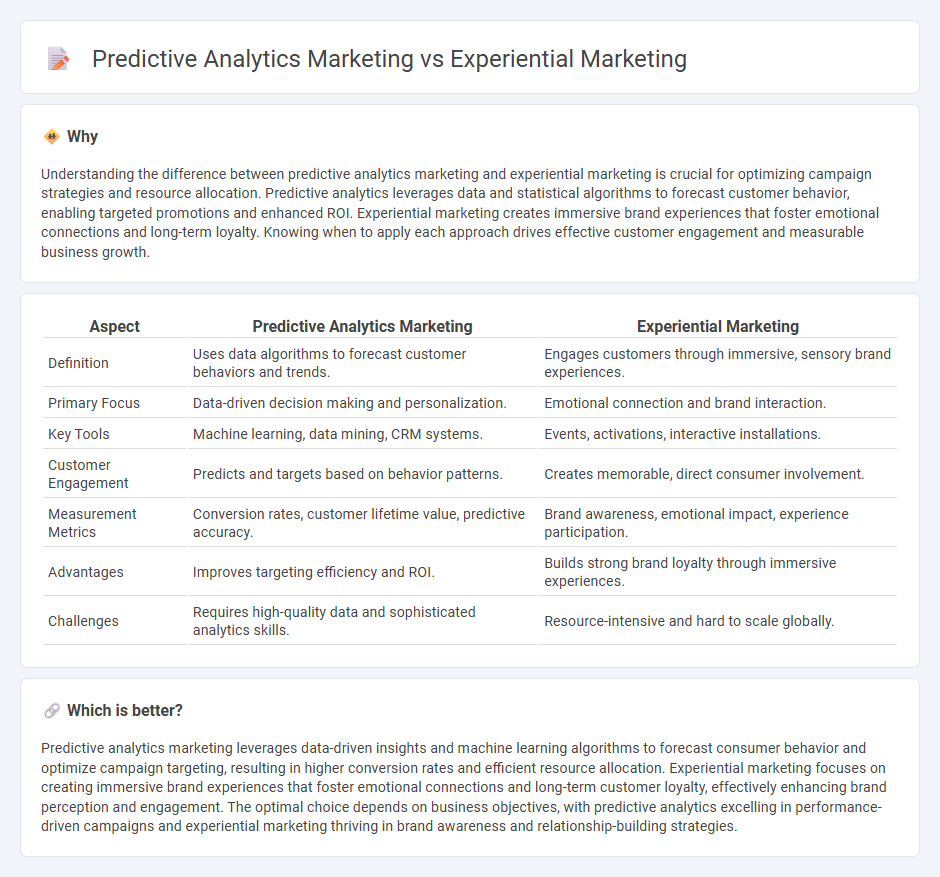
Predictive analytics marketing leverages data-driven models and machine learning algorithms to forecast consumer behavior, enabling targeted campaigns and optimized ROI. Experiential marketing focuses on creating memorable, interactive brand experiences that engage customers emotionally and encourage direct participation. Explore how blending predictive analytics and experiential marketing can revolutionize your strategy.
Why it is important
Understanding the difference between predictive analytics marketing and experiential marketing is crucial for optimizing campaign strategies and resource allocation. Predictive analytics leverages data and statistical algorithms to forecast customer behavior, enabling targeted promotions and enhanced ROI. Experiential marketing creates immersive brand experiences that foster emotional connections and long-term loyalty. Knowing when to apply each approach drives effective customer engagement and measurable business growth.
Comparison Table
| Aspect | Predictive Analytics Marketing | Experiential Marketing |
|---|---|---|
| Definition | Uses data algorithms to forecast customer behaviors and trends. | Engages customers through immersive, sensory brand experiences. |
| Primary Focus | Data-driven decision making and personalization. | Emotional connection and brand interaction. |
| Key Tools | Machine learning, data mining, CRM systems. | Events, activations, interactive installations. |
| Customer Engagement | Predicts and targets based on behavior patterns. | Creates memorable, direct consumer involvement. |
| Measurement Metrics | Conversion rates, customer lifetime value, predictive accuracy. | Brand awareness, emotional impact, experience participation. |
| Advantages | Improves targeting efficiency and ROI. | Builds strong brand loyalty through immersive experiences. |
| Challenges | Requires high-quality data and sophisticated analytics skills. | Resource-intensive and hard to scale globally. |
Which is better?
Predictive analytics marketing leverages data-driven insights and machine learning algorithms to forecast consumer behavior and optimize campaign targeting, resulting in higher conversion rates and efficient resource allocation. Experiential marketing focuses on creating immersive brand experiences that foster emotional connections and long-term customer loyalty, effectively enhancing brand perception and engagement. The optimal choice depends on business objectives, with predictive analytics excelling in performance-driven campaigns and experiential marketing thriving in brand awareness and relationship-building strategies.
Connection
Predictive analytics marketing utilizes data-driven algorithms to forecast consumer behavior, enabling tailored experiences that enhance customer engagement. Experiential marketing leverages these insights to create immersive brand interactions that resonate with targeted audiences on a deeper emotional level. Integrating predictive analytics with experiential marketing boosts campaign effectiveness by anticipating preferences and optimizing personalized customer journeys.
Key Terms
**Experiential Marketing:**
Experiential marketing creates immersive brand experiences that directly engage consumers' senses and emotions to foster strong, memorable connections. Brands like Coca-Cola and Nike leverage live events, interactive installations, and personalized encounters to drive customer loyalty and word-of-mouth promotion. Discover how experiential marketing transforms passive advertising into active brand participation for deeper consumer impact.
Brand Engagement
Experiential marketing drives brand engagement by creating immersive, sensory-rich interactions that foster emotional connections and memorable customer experiences. Predictive analytics marketing leverages data insights and machine learning algorithms to anticipate consumer behavior, enabling personalized campaigns that increase engagement efficiency and relevance. Explore how combining experiential tactics with predictive analytics can elevate your brand's customer engagement strategies.
Immersive Events
Experiential marketing leverages immersive events to create memorable, hands-on brand interactions that engage participants' senses and emotions, driving deeper customer connections and loyalty. Predictive analytics marketing uses data-driven insights to forecast consumer behaviors and optimize event targeting, enhancing personalization and ROI for immersive campaigns. Explore how integrating experiential strategies with predictive analytics can revolutionize your immersive event marketing efforts.
Source and External Links
Experiential Marketing: How To Create Immersive Brand Experiences - Experiential marketing engages consumers by inviting them to participate in memorable, interactive brand experiences like pop-up shops and live events, focusing on building emotional ties rather than direct sales metrics.
What Is Experiential Marketing? - Limelight Platform - Experiential marketing turns passive audiences into active participants through live, immersive events such as product demos or pop-ups, creating deep emotional connections and personalized brand relationships.
Engagement marketing - Wikipedia - Experiential marketing uses sensory and emotional experiences to engage customers, differentiating brands by creating loyal customers through meaningful, memorable interactions aligned with strategic brand communication.
 dowidth.com
dowidth.com